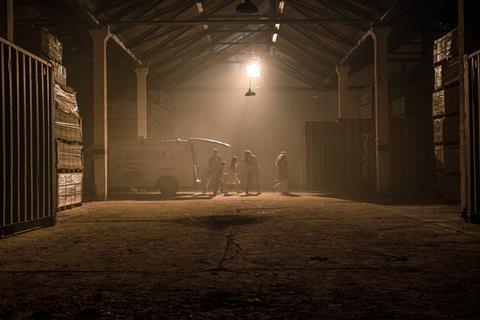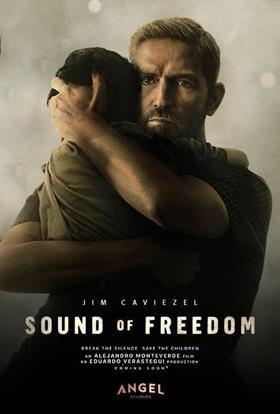The controversy and commentary around Sound of Freedom threatens to overshadow the important issues it raises. It’s the most perplexing cinema release of our times, says Nathanael Smith

Depending on who you listen to, the latest Christian film to take the US market by storm is either right-wing nonsense promoted by conspiracy-addled loons, or it’s a beacon of hope and purity in an otherwise compromised Hollywood system. Praise the film and you might be dismissed as a Trump-loving QAnon believer; criticise it and some might accuse you of supporting human traffickers. It has transcended its status as a mid-budget thriller to become a weapon of the culture wars; it has made millions upon millions of dollars in the US as a result, and now it’s coming to the UK.
Welcome to Sound of Freedom, one of the most perplexing cinema releases of recent times.
The film contains the true-ish story of Tim Ballard, a Homeland Security investigator who tracks and arrests paedophiles. Finding it impossible to stop the tide of child pornography, Ballard changes direction, going to the source of the problem by taking on the traffickers who steal these children and sell them to the highest bidders. Ballard’s plans escalate as he gets deeper into this murky world, setting up island raids for local police and going deep into the jungle to rescue an 11 year-old girl. The film ends with stark, sobering statistics about how many people around the world today are still in slavery.
Somehow, this film has become a flagship issue in the ever-raging ‘culture wars’ in America. ‘Worth it or Woke’ – a website to be avoided for the way that it reduces every review to how “woke” or not a film is – raved about it. Donald Trump endorsed it. Simultaneously, the left wing became suspicious of the film, put off because the right like it so much.
Curiously, it has also become attached to a number of conspiracy theories, as the real problem of human trafficking has recently become dangerously conflated with other baseless conspiracies to do with shady cabals running the world. The result has been people susceptible to these theories firing guns in pizza shops in an attempt to uncover politicians with sex slaves, or organising boycotts of furniture websites that were thought to be shipping children in overpriced dressers. Sound of Freedom has been swept up in this misplaced fervour. Its lead actor, Jim Caviezel, has parroted untruths about children being trafficked for vampiric medical experimentation, while Tim Ballard himself has shared views closely linked to QAnon theories. All of this has led to Sound of Freedom’s divisive reception, the film being branded as either insane or righteous.
What is perhaps most surprising about the film, then, is how little it has to do with any of the commentary that has attached itself to the film during its press tour. Firstly, it should go without saying that human trafficking is a real problem, a scourge of evil on the planet that should be eradicated. This should not be a political opinion! (Where it does get political becomes uncomfortable for the right wing, as punitive border measures make trafficking and family separation more likely). But more pertinent, is the fact it was written and shot by 2018, which as the Telegraph points out, was long before QAnon conspiracy theories had gained any traction in the US. The director of the film, Alejandro Monteverde has distanced himself from the conspiracies, telling Variety they “hurt my work”.
All of this is to say: Sound of Freedom should be judged on its merits as a film, set aside from any of the cultural noise that has accumulated around it along the way. This is true of all films, but it bears repeating here.

The good news, then, is that the film is not bad. It’s helped by Caviezel, a hugely talented actor who can portray immense feeling through his gaunt face and haunted eyes. What could easily have been a macho hero role is grounded by his sensitive performance. It’s also remarkably tense, particularly in a gripping section where they use a private island as a fake luxury hotel in order to rescue over 50 children. Director Alejandro Monteverde should be credited with managing to convey a glimpse of the horrors of child sex slavery without depicting any of its grisly details.
There are still gripes. Pre-credits text states that Ballard’s wife inspired him to act, but she is given very little to do in the film itself. It’s also not terribly cinematic, with choppy editing and flat lighting making it feel more like an episode of CSI than something worth seeing on the big screen.

Where the film struggles the most is in a dramatic final act that stretches credulity. Suddenly Tim is an action man, beating up bad guys and dodging bullets on a rickety old boat. It doesn’t feel believable, and the film loses its dramatic momentum as a result.
It’s worth noting that the film also gets child trafficking wrong, in a number of crucial ways. Several trafficking experts from the third sector, including many survivors, have lambasted the film. They accuse the film of sensationalising a form of evil that is usually much more mundane. Children are often coerced or sold into slavery through family members or people posing as a romantic partner, rather than the kidnapping depicted in the opening credits. Centring Ballard, a controversial figure, while making all of the villains Hispanic further muddies the waters.

As the credits roll, Jim Caviezel delivers a “special message” to the viewer, telling them that the most powerful person is the storyteller, so you should buy more tickets to Sound of Freedom and give them away. It’s possible that watching Sound of Freedom will reawaken you to the evil that is human trafficking and you want to do something as a result. Do not do as Caviezel urges; your time and money are better placed supporting reputable anti-trafficking organisations. It will make much more of a difference than endorsing a middling thriller that muddles the very topic on which is it trying to shed light.

Sound of Freedom will be showing in UK cinemas from 1 September






































1 Reader's comment